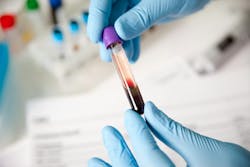The Alzheimer’s Association has published guidance regarding blood-based biomarker tests. The association announced the guidelines at their International Conference and in a release.
The Alzheimer’s Association recognized a need for “clear evidence-based, brand-agnostic recommendations to support more accurate and accessible diagnosis of Alzheimer’s using blood-based biomarker tests.” The standards, written by 11 clinicians and aided by public comments, will be revised as needed. The current draft covers the following tests: “plasma phosphorylated-tau (p-tau) and amyloid-beta (Aβ) tests measuring the following analytes: p-tau217, ratio of p-tau217 to non-p-tau217 ×100 (%p-tau217), p-tau181, p-tau231, and ratio of Aβ42 to Aβ40.”
Key points:
- For patients experiencing cognitive impairment who are being observed in specialized care for memory disorders: 1) blood-based biomarker tests with ≥90% sensitivity and ≥75% specificity can serve as a tool for diagnosing Alzheimer’s, but should be followed up with another methodology if a positive result is shown. 2) blood-based biomarker tests with ≥90% and specificity can replace PET amyloid imaging or CSF Alzheimer’s biomarker testing.
- Alzheimer’s Association warns that “there is significant variability in diagnostic test accuracy and many commercially available BBM tests do not meet these thresholds.”
- Blood-based biomarker tests should not replace clinical assessment.
About the Author
Sign up for our eNewsletters
Get the latest news and updates

